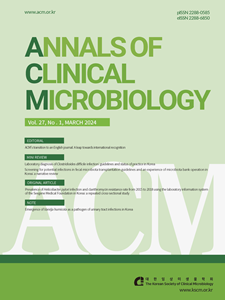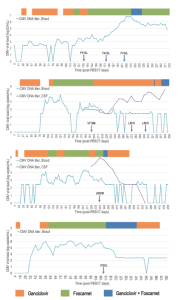
The first case of bacteremia caused by Bordetella hinzii in Korea
Case report Joonsang Yu, Sihwan Kim, Kyu-Hwa Hur, Heungsup Sung, Mi-Na Kim Department of Laboratory Medicine, University of Ulsan College of Medicine and Asan Medical Center, Seoul, Korea Corresponding to Mi-Na Kim, E-mail: mnkim@amc.seoul.kr Ann Clin Microbiol 2022;25(3):97-102. https://doi.org/10.5145/ACM.2022.25.3.5Received on 25 January 2022, Revised on 1 May 2022, Accepted on 17 May 2022, Published on 20 September 2022.Copyright © Korean Society of Clinical Microbiology.This is an Open Access article distributed under the terms of the Creative Commons Attribution Non-Commercial License (https://creativecommons.org/licenses/by-nc/4.0/) which permits unrestricted non-commercial use, distribution, and reproduction in any medium, provided the original work is properly cited. Abstract Bordetella hinzii is a nonfermenting, gram-negative rod and a rare opportunistic pathogen that can cause respiratory infections, bacteremia, and cholangitis. Here, we report the first case of bacteremia caused by B. hinzii in Korea. A 59-year-old man was admitted for the biopsy of a mass lesion in the left lower


